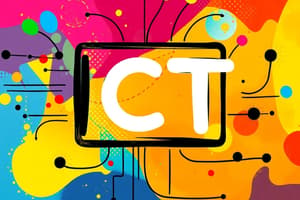Podcast
Questions and Answers
Apa yang dimaksud dengan keterampilan Literasi TIK?
Apa yang dimaksud dengan keterampilan Literasi TIK?
- Kemampuan memasang jaringan dan mengonfigurasi pengaturan jaringan.
- Pemahaman terhadap ancaman siber dan praktik menjelajah internet yang aman.
- Kemampuan mengoperasikan sistem operasi dan aplikasi. (correct)
- Kemampuan menggunakan email, chat, dan video konferensi untuk komunikasi personal dan profesional.
Metode evaluasi apa yang digunakan untuk mengukur tingkat kenyamanan individu dalam penggunaan TIK?
Metode evaluasi apa yang digunakan untuk mengukur tingkat kenyamanan individu dalam penggunaan TIK?
- Survei (correct)
- Pengamatan langsung
- Evaluasi Diri
- Tes dan Kuis
Apa strategi yang dianjurkan untuk meningkatkan Literasi TIK di tempat kerja?
Apa strategi yang dianjurkan untuk meningkatkan Literasi TIK di tempat kerja?
- Pembelajaran Mandiri
- Tidak Perlu Pembaruan
- Kerja Mandiri Tanpa Bantuan
- Program Pelatihan (correct)
Bagaimana cara individu dapat mengevaluasi keterampilan TIK mereka sendiri?
Bagaimana cara individu dapat mengevaluasi keterampilan TIK mereka sendiri?
Apa manfaat utama penggunaan teknologi dalam pendidikan? d.
Apa manfaat utama penggunaan teknologi dalam pendidikan? d.
Flashcards are hidden until you start studying
Study Notes
ICT Literacy: Bridging the Digital Divide
Information and Communication Technology (ICT) literacy refers to an individual's ability to use digital tools effectively to find, evaluate, create, and communicate information. In today's world, ICT literacy is essential for individuals to stay informed, connected, and productive. This article explores various aspects of ICT literacy, focusing on its importance, components, assessment methods, and strategies to enhance it.
Importance of ICT Literacy
ICT literacy plays a crucial role in personal and professional success. It enables individuals to:
- Access Information: With increasing reliance on online resources, being able to locate, understand, and assess information efficiently becomes vital.
- Communication Skills: Digital platforms facilitate communication across geographical boundaries, making proficiency in using these tools necessary for effective collaboration and networking.
- Career Opportunities: Many industries require employees with strong ICT skills; hence, having a good command over ICT technologies can widen one's job prospects.
- Personal Development: ICT literacy helps individuals maintain a presence on social media, manage finances, and even access healthcare services remotely.
Components of ICT Literacy
The components of ICT literacy include:
- Hardware Knowledge: Understanding how electronic devices work, their maintenance, and repair.
- Software Proficiency: Familiarity with operating systems, applications, and software troubleshooting.
- Networking Skills: Ability to connect to networks, configure network settings, and manage internet connections.
- Cybersecurity Awareness: Recognizing potential threats, maintaining privacy settings, and understanding safe browsing practices.
- Digital Communication Skills: Using email, chat, video conferencing, etc., for personal and professional communication.
Assessment Methods
Various methods exist to measure ICT literacy:
- Surveys: Questionnaires can be used to gauge individuals' comfort levels with different aspects of ICT use.
- Quizzes and Tests: These can assess knowledge about specific software programs or digital concepts.
- Observations: Direct observation of how individuals interact with technology can reveal their proficiency levels.
- Self-evaluation: Individuals may rate their own skills based on predefined criteria or benchmarks.
Strategies to Enhance ICT Literacy
To improve ICT literacy, several strategies can be employed:
- Training Programs: Organizations can offer workshops, courses, or online tutorials to teach employees new skills.
- Peer Learning: Encouraging collaboration among colleagues allows them to learn from each other's experiences.
- Regular Updates: Keeping up-to-date with technological advancements ensures that one remains competent in using the latest tools.
- Practice: Regularly engaging in activities like creating presentations, editing documents, or using specialized software helps reinforce learning.
In conclusion, ICT literacy is not just a skill; it's a necessity in our increasingly digital world. By understanding its importance and taking steps to enhance it, we can bridge the digital divide and ensure everyone benefits from the opportunities that come with greater familiarity with information and communication technologies.
Studying That Suits You
Use AI to generate personalized quizzes and flashcards to suit your learning preferences.




